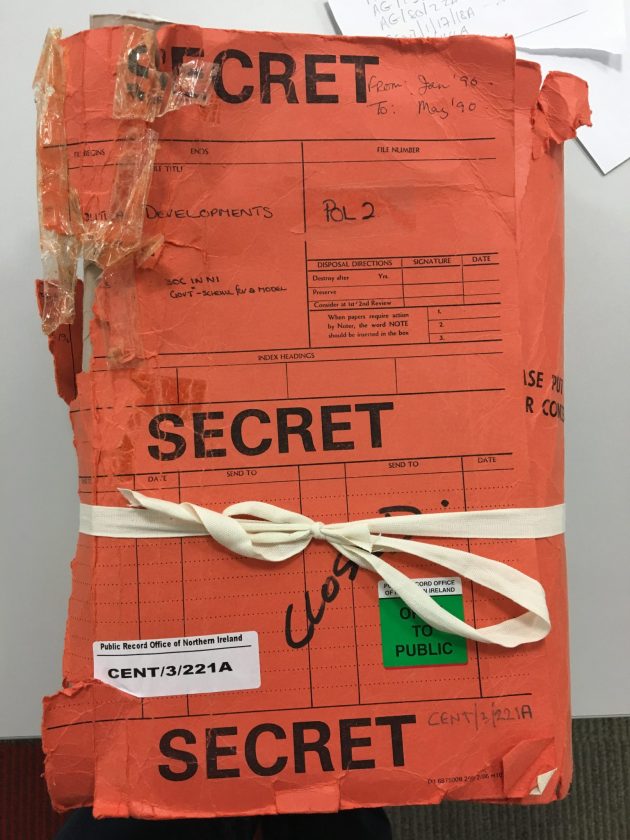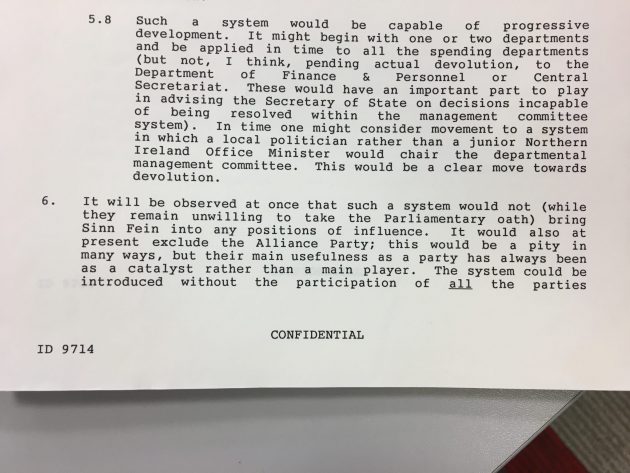 CENT/3/221A (selective scans) is a very battered orange film, three inches thick and marked as Political Developments. Political anoraks interested in the twists and turns of the talks in the late eighties and early nineties will be fascinated by some of the detail in this file which has been released today under the 20 Year Rule. You can view the file at the Public Records Office in Titanic Quarter.
CENT/3/221A (selective scans) is a very battered orange film, three inches thick and marked as Political Developments. Political anoraks interested in the twists and turns of the talks in the late eighties and early nineties will be fascinated by some of the detail in this file which has been released today under the 20 Year Rule. You can view the file at the Public Records Office in Titanic Quarter.
One bundle of papers outlines Sir Kenneth Bloomfield’s August 1989 proposals for ‘a model of consensus government’. While the “prospects of achieving full devolution of legislative and executive powers still seem remote”, over the course of a five page document, the then head of the NI Civil Service pondered the creation of a system which would be “unboycottable … stable … capable of experimental introduction and capable of development”.
The proffered model would have been piloted with the introduction of “more local elected influence into … the management of one or more Northern Ireland Departments”. The new “management committee” (deliberately avoiding the use of the word “consultative”) would be chaired by the direct rule NIO minister and included MPs, the MEP or nominated alternatives (district councillors or members of the party).
The new management committees would take decisions about the “development of departmental policy” through a system of cross-system consensus, but would not have power to take not individual “case decisions”.
“It might begin with one or two departments and be applied in time to all the spending departments (but not, I think, pending actual devolution, to the Department of Finance & Personnel or Central Secretariat) … In time one might consider movement to a system in which a local politician rather than a junior Northern Ireland Office Minister would chair the departmental management committee. This would be a clear move towards devolution.”
 Bloomfield noted the limits to the model’s inclusivity with a damning assessment of the Alliance Party’s role in
Bloomfield noted the limits to the model’s inclusivity with a damning assessment of the Alliance Party’s role in
“It will be observed at once that such a system would not (while they remain unwilling to take the Parliamentary oath) bring Sinn Féin into any positions of influence. It would also at present exclude the Alliance Party; this would be a pity in many ways, but their usefulness as a party has been as a catalyst rather than a main player … I believe, the DUP and SDLP could work it, even if DUP decided initially to stay out. Failure to reach agreement once the system was in place would not mean a collapse of the system; simply a reversion to decision-making by the Secretary of State himself in instances where broad local agreement could not be found.” [emphasis added]
The comments about Alliance don’t seem to have been repeated to their leader’s face over the coming months when the Secretary of State Peter Brooke repeatedly met John Alderdice in Stormont Castle to discuss political development!
The Northern Ireland Office took the opportunity to critique the proposals. One suggested that the allocation of places on the committee should he shared between the parties on the basis of “electorate support … at the district council elections” rather than ratios at Westminster.
If the today’s parties fail to compromise (or resolve their differences) and the Executive remains dormant for much of 2018, perhaps a reworked model of Assembly committees will be called upon to advise the small team of NIO ministers and departmental permanent secretaries currently running NI?
Alan Meban. Tweets as @alaninbelfast. Blogs about cinema and theatre over at Alan in Belfast. A freelancer who writes about, reports from, live-tweets and live-streams civic, academic and political events and conferences. He delivers social media training/coaching; produces podcasts and radio programmes; is a FactCheckNI director; a member of Ofcom’s Advisory Committee for Northern Ireland; and a member of the Corrymeela Community.
Discover more from Slugger O'Toole
Subscribe to get the latest posts to your email.

